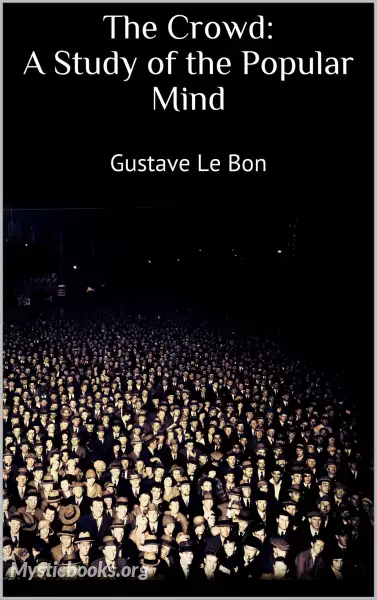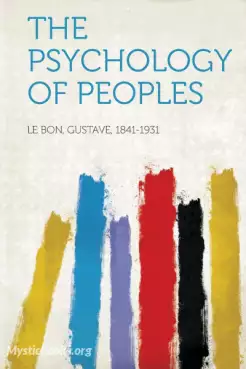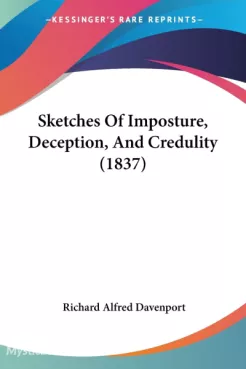
The Crowd: A Study of the Popular Mind
'The Crowd: A Study of the Popular Mind ' Summary
The Crowd: A Study of the Popular Mind is a book authored by Gustave Le Bon that was first published in 1895.
In the book, Le Bon claims that there are several characteristics of crowd psychology: "impulsiveness, irritability, incapacity to reason, the absence of judgement of the critical spirit, the exaggeration of sentiments, and others." Le Bon claimed that "an individual immersed for some length of time in a crowd soon finds himself – either in consequence of magnetic influence given out by the crowd or from some other cause of which we are ignorant in a special state, which much resembles the state of fascination in which the hypnotized individual finds himself in the hands of the hypnotizer."
However his work has been criticised, for example Stephen Reicher, a professor in crowd psychology, says: "there’s a clear racism, 19th century racism, and ageism, and elsewhere there is sexism which inhabits that view. In brief, it’s the mad mob view, it’s a view that you see every time you see collective behavioral riots, it’s the fact that these people aren’t protesting about anything, they don’t have any grievances, they don’t had any reason, they are ‘mad’, so we’ve got nothing to ask about ourselves, and the inequalities of our society, we can just point at them and say it’s just about them." Additionally more recent research has cast doubt on many of the work's conclusions such as a hypothesised loss of agency and the book's focus on individualism as a psychological paradigm.
"Civilisations as yet have only been created and directed by a small intellectual aristocracy, never by crowds. Crowds are only powerful for destruction. Their rule is always tantamount to a barbarian phase. A civilisation involves fixed rules, discipline, a passing from the instinctive to the rational state, forethought for the future, an elevated degree of culture all of them conditions that crowds, left to themselves, have invariably shown themselves incapable of realising. In consequence of the purely destructive nature of their power crowds act like those microbes which hasten the dissolution of enfeebled or dead bodies. When the structure of a civilisation is rotten, it is always the masses that bring about its downfall."
Book Details
Language
EnglishOriginal Language
FrenchPublished In
1895Genre/Category
Tags/Keywords
Authors

Gustave Le Bon
United Kingdom
Charles-Marie Gustave Le Bon was a leading French polymath whose areas of interest included anthropology, psychology, sociology, medicine, invention, and physics. He is best known for his 1895 work Th...
Books by Gustave Le BonDownload eBooks
Listen/Download Audiobook
- Select Speed
Related books

Brain and Personality, or the Physical Relations of the Brain to the Mind by William Hanna Thomson
One of the earlier works on brain science, relating what was then known or conjectured about the connection between the physical brain and the individ...

Сказки by Mikhail Saltykov-Shchedrin
Сказочный цикл Салтыкова-Щедрина создавался писателем на протяжении 18 лет - с 1869 по 1886 год. Каждая из сказок Щедрина — законченное произведение....

Visioning, A Novel by Susan Glaspell
In "Visioning," Susan Glaspell explores the journey of Katie Jones, a young woman grappling with the confines of her sheltered world. When Anne, a mys...

Zapiski iz podpolya (Notes from the Underground) by Fyodor Dostoyevsky
Notes from Underground by Fyodor Dostoevsky is a sophisticated novell with extremely hard to comprehend philosophical ideas lying on the border of par...

Human, All Too Human: A Book For Free Spirits, Part II by Friedrich Nietzsche
Human, All Too Human is a collection of aphorisms by Friedrich Nietzsche, where he explores various facets of human nature and existence. Nietzsche's...

The Psychology of Peoples by Gustave Le Bon
"It is barely a century and a half ago that certain philosophers, who, it should be remarked, were very ignorant of the primitive history of man, of t...

Pauls Ontwaken by Frederik van Eeden
In his poignant memoir, "Paul's Awakening," Dutch psychiatrist and author Frederik van Eeden recounts the life and death of his son, Paul, who passed...

Sketches of Imposture, Deception, and Credulity by Richard Alfred Davenport
This is a captivating book that explores the intriguing world of fraudulent schemes, deceptive practices, and the human inclination towards credulity....

The Soul or Rational Psychology by Emanuel Swedenborg
Metaphysical discipline that attempted to determine the nature of the human soul by a priori reasoning. This is a recording of the 1849 translation of...

The Mind And Its Education by George Herbert Betts
Betts describes consciousness as a process or a stream that begins in the cradle with the baby’s first groping for light and so at the end with the la...
Reviews for The Crowd: A Study of the Popular Mind
No reviews posted or approved, yet...